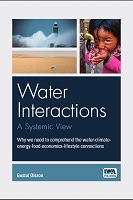Water interactions
A systemic view : Why we need to comprehend the water-climate-energy-food-economics-lifestyle connections
| dc.contributor.author | Olsson, Gustaf | |
| dc.date.accessioned | 2022-08-18T05:30:53Z | |
| dc.date.available | 2022-08-18T05:30:53Z | |
| dc.date.issued | 2022 | |
| dc.identifier.uri | https://library.oapen.org/handle/20.500.12657/57950 | |
| dc.description.abstract | During the last two decades, the interrelationship between water and energy has become recognized. Likewise, the couplings to food and agriculture are getting increasingly obvious and alarming. In the last year, a record number of extreme weather events have been reported from most parts of the world. This is a visible demonstration how consequences of climate change must be understood and alleviated. The impacts of economics, lifestyle, and alarming inequalities are becoming increasingly recognisable. If the wealthy part of the world is not willing not make radical changes it does not matter what the less wealthy half of the global population will do to meet the climate and resource crisis. The purpose of the book is to demonstrate and describe how climate change, water, energy, food, and lifestyle are closely depending on each other. It is not sufficient to handle one discipline isolated from the others. This is the traditional ìcomponent viewî. The book defines and describes a systems view. The communications and relationships between the ìcomponentsî have to be described and recognized. Consequently, the development of one discipline must be approached from a systems perspective. At the same time, the success of the systems perspective depends on the degree of knowledge of the individual parts or disciplines. The catchphrase of systems thinking has been caught in the phrase, ìThe whole is more than the sum of its partsî. The idea is not new: the origin of this phrase is to be found already in Aristotleís Metaphysics more than 2300 years ago. The text may serve as an academic text (in engineering, economics, and environmental science) to introduce senior undergraduate and graduate students into systems thinking. Too often education encourages a ìsiloî thinking. Current global challenges canít be solved in isolation; they depend on each other. For example, water professionals should have a basic understanding of energy issues. Energy professionals ought to understand the dependency on water. Economic students should learn more how economy depends on natural resources like energy and water. Economics must include the environmental impact and ecological ceiling of economic activities. | |
| dc.language | English | |
| dc.subject.classification | thema EDItEUR::T Technology, Engineering, Agriculture, Industrial processes::TQ Environmental science, engineering and technology | en_US |
| dc.subject.classification | thema EDItEUR::P Mathematics and Science::PD Science: general issues::PDG Industrial applications of scientific research and technological innovation | en_US |
| dc.subject.classification | thema EDItEUR::T Technology, Engineering, Agriculture, Industrial processes::TT Other technologies and applied sciences::TTU Mining technology and engineering | en_US |
| dc.subject.other | Science | |
| dc.subject.other | Environmental Science | |
| dc.subject.other | Science | |
| dc.subject.other | Applied Sciences | |
| dc.subject.other | Technology & Engineering | |
| dc.subject.other | Mining | |
| dc.title | Water interactions | |
| dc.title.alternative | A systemic view : Why we need to comprehend the water-climate-energy-food-economics-lifestyle connections | |
| dc.type | book | |
| oapen.identifier.doi | https://doi.org/10.2166/9781789062908 | |
| oapen.relation.isPublishedBy | dc3cfe72-8424-48e6-b8e0-fca2844ba38e | |
| oapen.relation.isFundedBy | b818ba9d-2dd9-4fd7-a364-7f305aef7ee9 | |
| oapen.relation.isbn | 9781789062892 | |
| oapen.collection | Knowledge Unlatched (KU) | |
| oapen.imprint | IWA Publishing | |
| oapen.identifier | https://openresearchlibrary.org/viewer/86c19589-f3a5-43e6-9e75-dcfc5e24e31e | |
| oapen.identifier.isbn | 9781789062892 |

